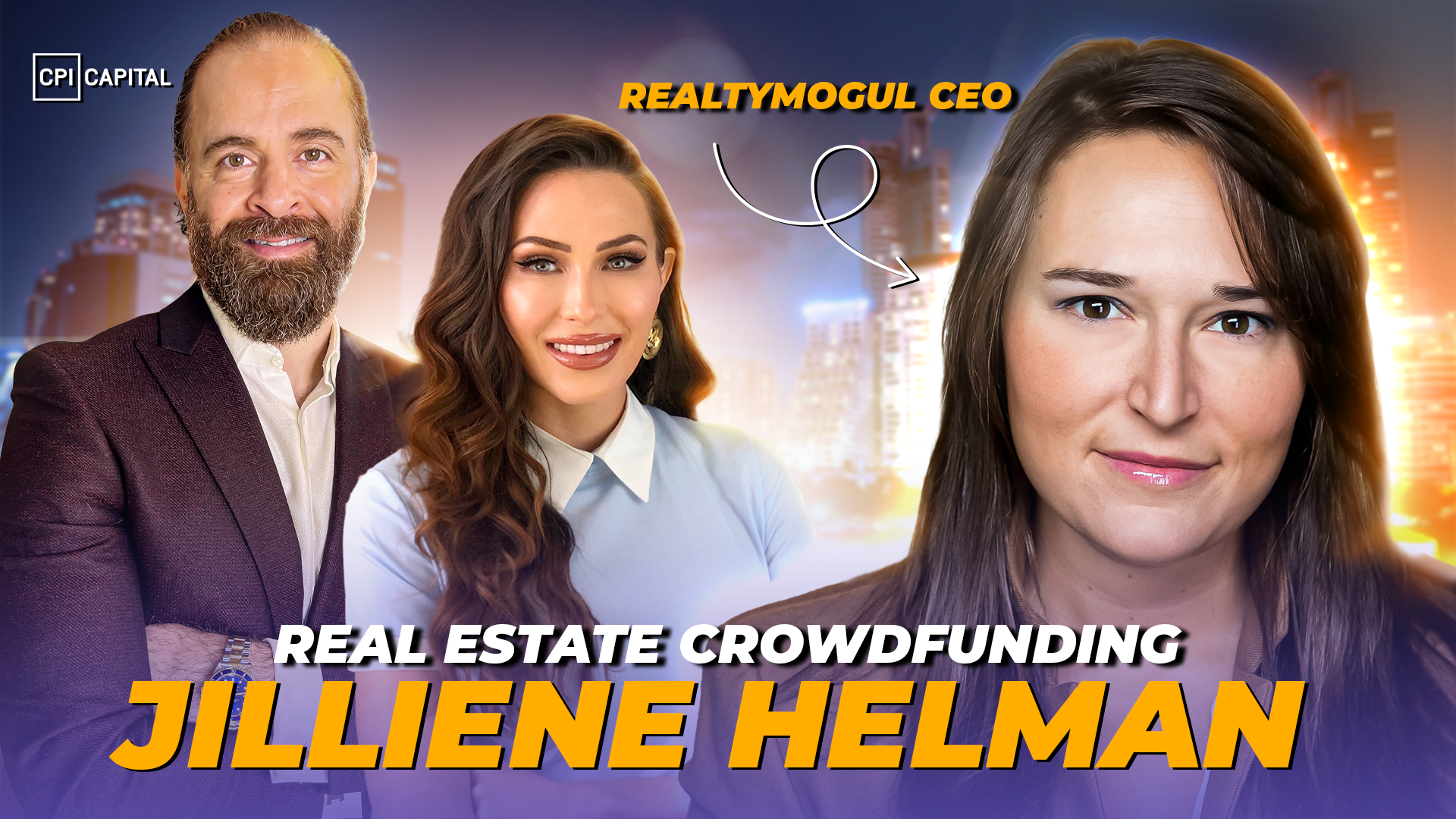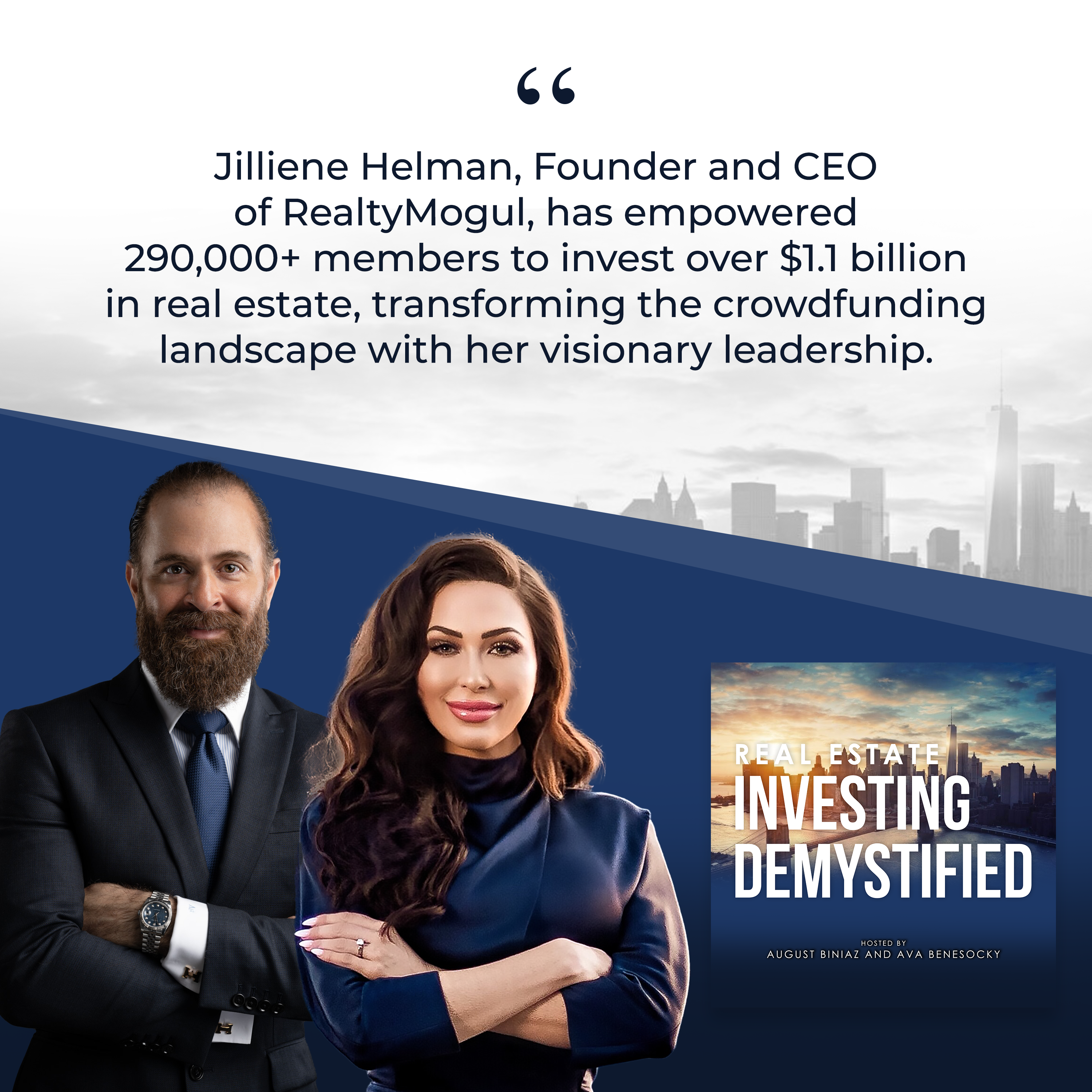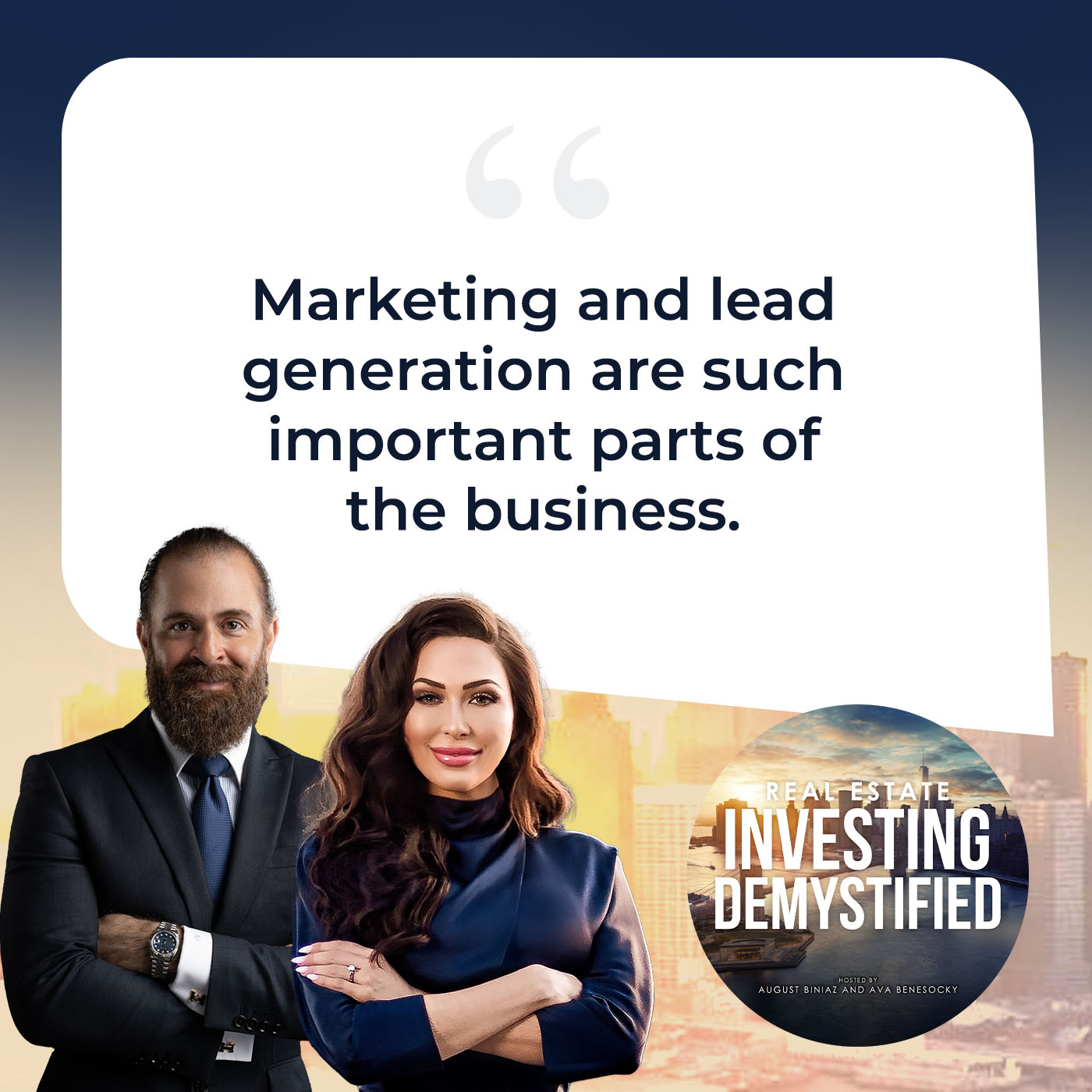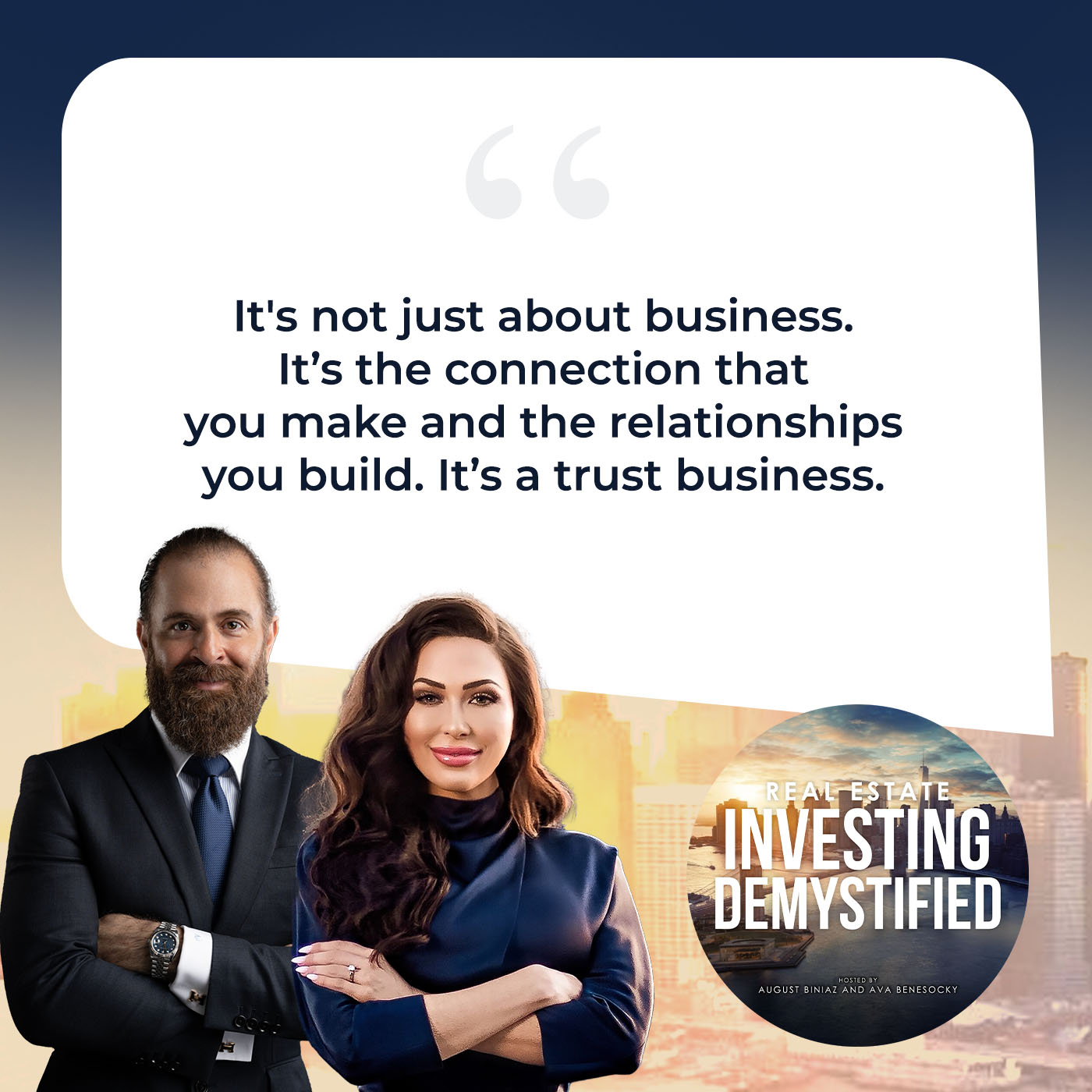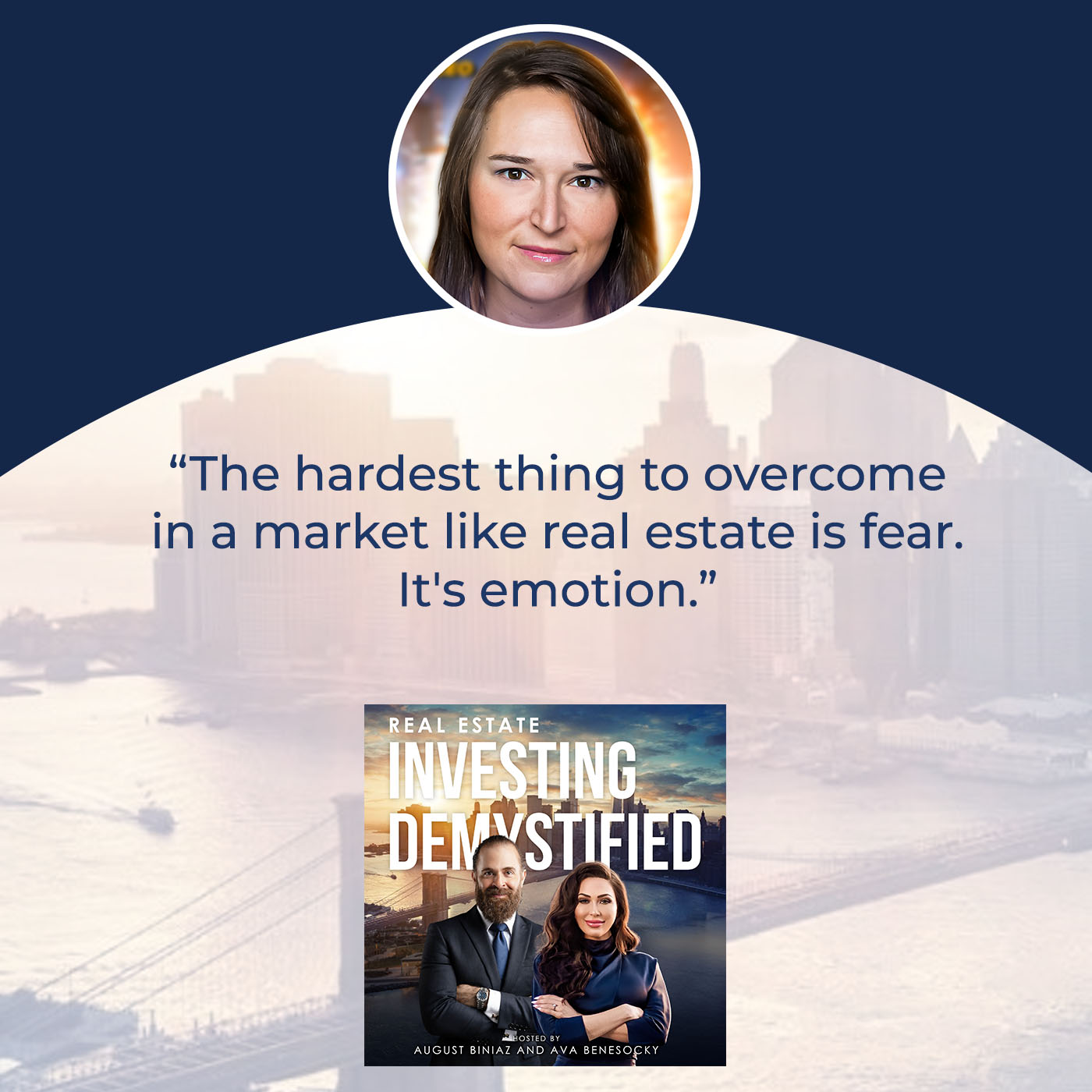Real estate crowdfunding has flipped the script on property investing. It’s like a backstage pass to real estate, letting you diversify your portfolio and aim for big returns. In this episode, Ava Benesocky and August Biniaz sit down with Jilliene Helman, the founder and CEO of RealtyMogul. Jilliene details her journey from an entrepreneurial upbringing to becoming a real estate crowdfunding pioneer. She covers the JOBS Act’s impact, the challenges and opportunities of creating a digital real estate platform, and the future of real estate crowdfunding. Gain valuable knowledge on how real estate crowdfunding is reshaping property investment and creating new opportunities for investors and entrepreneurs.
Get in touch with Jilliene Helman:
If you are interested in learning more about passively investing in multifamily and build-to-rent properties, click here to schedule a call with the CPI Capital Team or contact us at info@cpicapital.ca. If you like to co-syndicate and close on a larger deal as a general partner, click here. You can read more about CPI Capital at https://www.cpicapital.ca.
#avabenesocky #augustbiniaz #cpicapital
—
Watch the video here
Listen to the podcast here
Important Links
- RealtyMogul
- Ready Player One
- The Outsiders
- LinkedIn – Jilliene Helman
About Jilliene Helman
Jilliene Helman is the Founder and CEO of RealtyMogul, a leading online platform for real estate investing with over 280,000 members. Through the platform, individual investors have collectively invested over $1.1 billion of capital into over $7 billion of real estate assets (as of 1/31/2024). Jilliene holds Series 7, 24 and 63 investment licenses and is a Certified Wealth Strategist. She’s been featured as an expert on startups and real estate investing on Bloomberg, CNBC, The New York Times, Yahoo! Finance and Entrepreneur.
Real Estate Crowdfunding Revolution: Insights From RealtyMogul CEO Jilliene Helman
RealtyMogul
I’m excited. We have another woman founder and CEO on the show from RealtyMogul.
I guess you have a friendship with our guest that’s coming on, and then you guys were in Miami. You spent some time there.
We had some dinner in Miami. We have a lot in common. We both moved to Florida for lifestyle and business. We are both new mothers. We had lots in common there so we had a great conversation over a nice dinner together.
Talking about Florida, every time we start our show, I look at myself, I’m like, “That Florida tan is fading away.” We got to get back to Florida. Why don’t you go ahead and tell our readers about our guest?
In this episode, we’re joined by Jilliene Helman. She is the Founder and CEO of RealtyMogul, a leading online platform for real estate investing with over 290,000 members. Through the platform, individual investors have collectively invested over $1.1 billion of capital into over $7 billion of real estate assets. We’re excited to dive into things with you, Jilliene. Welcome to the show. Thanks for being here.
Thanks for having me. I am excited to do it.
She’s got more subscribers to our platform than the population of Barbados.
Isn’t that a cool stuff?
I had no idea. Thank you for the statistic.
Jilliene, please tell us about your background and how the idea of starting RealtyMogul a real estate crowdfunding platform came about. Also, what was the initial vision you had for the platform?
I grew up in an entrepreneurial family. I’m the youngest of seven kids, and four of the seven are CEOs running companies. My dad was an entrepreneur and my mom was entrepreneurial. I grew up in a household where entrepreneurship was celebrated. Also, risk-taking was celebrated on the professional front. I came out of undergraduate business school. I went to work in banking.
In 2012, I learned about the JOBS Act, which was a new piece of legislation that essentially made the industry that I’m in legal. Historically, you could not market private investments. You’d have to know a guy at the country club, the golf club, or where wealthy people hang out. The JOBS Act legalized marketing. What that allowed us to do was digitally market private investments publicly through a piece of legislation that’s now colloquially referred to as 506(c) exemption and that was the impetus for the company.
I think when the JOBS Act was originally written, a lot of people thought that it was going to be for small businesses like your local restaurant, your local bakery, or your local dessert shop. What I looked at was this legislation, and I said, “I think there’s a big opportunity here to do something in real estate,” because there’s the opportunity in a real estate asset to do distributions, kickoff cashflow to investors on certain types of investments, and there should be decent virality around that.
That was the core concept over a decade ago and we haven’t pivoted the business. We’ve scaled and expanded the business. We had gone horizontal in certain directions, but fundamentally, it’s the same concept which is giving investors access to real estate investments, doing it online so they can come and make an investment from the comfort of their own home and doing it in a way that takes advantage of this new law. That was the first time since the 1930s that the Securities laws were augmented and changed for the digital era.
At the same time when the crowdfunding buzz started and also the world of syndication, putting together funds, advertising, and you have people like Grant Cardone who came out of that kind of start within that technology and regulation. What differentiates crowdfunding and for somebody syndicating a deal, putting a deal together, and bringing a few investors? What differentiates the two?
I think they’re synonymous. Maybe crowdfunding is you’re doing it digitally and syndication is you’re still potentially doing some of it, at the country club network, if you will, or in the high net worth circles. Crowdfunding is syndication on the internet. I use those two words pretty interchangeably.
I want to distinguish something as well for our Canadian viewers because in Canada, under the Securities Commission, crowdfunding, there’s an actual exemption to raise capital on certain regulations you follow. Jilliene talked about a 506(c). In Canada, there’s an exemption called the crowdfunding exemption, where you can raise money from accredited and non-accredited investors, but it caps you at $2,500 per investor. Sometimes in crowdfunding, the business, the process, and the crowdfunding exemption are in Canada.
There’s nuance in the US too. We’re not a crowdfunding portal. You can be a crowdfunding portal and you can use Reg CF. We are none of that. When I use the term crowdfunding, it’s colloquial. We’re not a crowdfunding portal. We’re a fully registered broker-dealer, but I think crowdfunding’s turned into a verb like two crowdfunds or Google. It’s the same kind of concept.
Crowdfunding Landscape
Jilliene, what did the crowdfunding landscape look like when you first entered the space back in the day? What was the real estate crowdfunding environment like when you started, especially in terms of competition? It’s because you’ve been in this space for a while now. How did the landscape of democratizing access to real estate investments look like, particularly when they introduced the JOBS Act in 2012?
It didn’t exist. We were one of the very first companies to even attempt this. There was no industry. We were so early that there was no industry. We spent millions and millions of dollars turning crowdfunding into a verb like familiarizing people with the industry. I think at the peak, there were probably 100 companies doing what we do. We’re probably backed down to 5 or 6 now.
There are a lot of real estate companies who will advertise digitally on their own. They’re running their own digital marketing and they’re building their own databases of individual investors but as far as platforms and online investing platforms, there’s only a handful now. It was this industry that grew out of nothing, had a huge boom, and then frankly, had somewhat of a bust when companies didn’t build the right businesses, didn’t focus on the right business models, or grew too fast. A number of mistakes that entrepreneurs make, and we made plenty on our own as well but it’s now stabilized quite a bit with 5 or 6 players in the industry.
When you first started, there were probably so many challenges. Being one of the first companies out there and trying to educate everybody on what crowdfunding meant, how did you attract your first users and investors to the platform when crowdfunding was just this new concept?
It was very grassroots. I was raising capital for the company. I was raising our seed round. I wanted to raise $1 million of seed capital for the company and I did any pitch event that I could get into. It was not only to raise capital for the corporate entity, but the folks that are at all these venture pitches and Angel investor pitches, they’re all accredited investors.
My ulterior motive, if you will, was could also invest in real estate on the platform, and could I go to these events and get people to sign up with RealtyMogul because they’re interested in what we’re doing and they subsequently turn into real estate investors. That was one way that was very grassroots. It’s free. These Angel networks typically don’t pay you to pitch. They want good companies or the opportunity for good companies. That was one way.
Another way was I would call personally everybody who would join the platform. For the first 2,000 signups, I would call personally. “Thank you for joining the platform.” It was very much a very high-touch approach, but it was grassroots and high-touch. In the early stages of being an entrepreneur, you do a bunch of stuff that doesn’t scale because it’s not about scaling. It’s about getting your first thousand raving fans. Can you find a thousand people who love you, want to buy your product, and want to do subsequent business with you? That’s what it’s all about in those early days of entrepreneurship.

Real Estate Crowdfunding: In the early stages of being an entrepreneur, you do a bunch of stuff that doesn’t scale because it’s not about scaling.
I love to hear that because when I show up to some investor calls over the years, people are like, “Wait a second. You’re the CEO. I didn’t realize it was going to be you on the call.” It’s the connection that you make and I say, “I’m focused on the equity side of the business as well, and this is a relationship of business. It’s a trust business.” I love that you took that path years and years ago because as we have started CPI Capital as well, we went through that same thing to grow the company.
When Jilliene talks about the early stages of RealtyMogul, getting those leads coming in and chatting with those investors, we feel the same way. When we first started CPI, our focus was real estate investing, but then we realized marketing and lead gen were such an important part of the business, especially with us, with both Canada and the US. I also want to decipher this idea of raising money for a real estate deal and raising money for the company that is conducting real estate deals.
You talked about crowdfunding to raise money for the deals or syndication. We discussed a lot on this show, but then you talked about seed funding and pre-seed or VC funding. When you’re raising money for the entity itself or RealtyMogul itself for that idea of that business, but within that business, there’s also another process where you’re raising money on a per-deal basis. I wanted to touch on that, which you have already.
Our core business is helping real estate companies raise capital for their real estate transactions. It could be third-party real estate companies. We also have a captive real estate company that we own and operate, which is part of RealtyMogul. We also have a fund management platform that’s part of RealtyMogul. All of those subsidiaries use the technology platform to raise capital for their deals.
That’s the core business. The core business is involved in raising capital for real estate transactions, but we also raise capital separately for the company itself. I think that’s what you’re referring to, August. Most of our capital for the company itself has been from venture capital investors. In our Angel round, we raised some capital from accredited investors, but our Series A and Series B were both financed by venture investors who are very different than a real estate investor.
They have different risk profiles and reward profiles. They don’t expect any distributions, long-term duration, and long-term life of their fund. They tend to be quite different from an investor profile. We saw that in building our company, raising capital for the company, and then helping to raise capital for real estate transactions.
A lot of times on these interviews, in preparation for the show, we were watching a few interviews you’ve been on. That process gets skimmed over. We’re early stages of trying to figure out all the mechanics and the moving parts. Did you have advisors? Did you have mentors along the way to not only build this new kind of concept, this fascinating idea of crowdfunding but also then go to investors and VC type of investors? Was there somebody assisting in that process at that stage?
Yeah. I’ve had a CEO coach now for years and years. I can’t imagine operating without them. It’s been a huge part of my growth and my trajectory because a lot of times, “Where do you go as a CEO?” You’re managing the board of directors so you want to be having transparent conversations with your board of directors, but you’re not having every conversation with that board of directors.
I’m also really active in YPO, which is called Young Presidents Organization, and it’s a consortium of CEOs. I spent eight years in a forum with eight other CEOs, and they were all in different industries. They weren’t in real estate. They were all running different businesses, whether they were healthcare businesses, pharmacies, finance companies, etc.
We didn’t have any overlap in the type of business, but it was incredibly powerful in, “How do you grow a business? How do you establish a business? How do you make sure that you’re spending your time and energy on the right things? How do you set priorities? A lot of that I learned from my CEO mentor group, which is an important part of the trajectory of our company.
On Deals
It’s amazing that you say that because a woman in this space is a rarity so it’s great to see that. I want to touch on the early stages of RealtyMogul when you guys utilized that legislation that came out allowing you to crowdfund and raise money for the deals. Were you purchasing real estate deals? Was it the company itself purchasing the real estate deals?
I watched some of your interviews. You guys bought a duplex on your first deal or what have you ever done and now, it’s that commercial real estate institutional deal with operators. Early on, was there any sponsor-operator that you guys were partnering with or was it a deal that you had purchased yourself?
Early on, it was all partnerships with third-party real estate companies, and third-party sponsors, but we also had a lending business. We haven’t lent some time. The lending business is very much a commodity business, but in the early days, we didn’t have enough money to do big commercial deals. Our first transaction was a $110,000 duplex, and that was a loan.
We did a hard money loan on this $110,000 duplex. We had a couple of investors invest $25,000 in a loan, $15,000 in a loan to make up that original $110,000. We had a lending business. It was a hard money lending business on single-family homes. We’re not in that business anymore. We shut that down many years ago. It’s been a long time since we’ve done any single-family loans but that’s where we started because we couldn’t raise $5 million for an apartment building. It was too big for us and too much for us.
The bulk of the business now is investing in apartment buildings while partnering with operators, and sponsors who manage and execute the business plan for these apartment communities that are purchased collectively.
We have three legs of the stool now. The first leg of the stool is our broker-dealer where we work with third-party real estate companies to help them raise capital. About 75% of the historical business has been in multi-family assets. The remaining 25% is in commercial assets. Industrial, retail, self-storage, limited on office, limited on hospitality, but a little bit of that.
The second leg of the business is a fund management business. We have a registered investment advisor and we manage two funds. One’s an income fund and one’s an apartment growth fund. We’re focused on value-added apartments. The third leg of the stool is a business called RM Communities where we own and operate multi-family properties ourselves. All of those businesses are linked.
The fund management business uses the technology platform to raise capital. The real estate company uses the technology platform to raise capital. There are a lot of synergies across the companies. The majority of the business is still the digital platform where real estate companies can raise capital and investors can diversify into assets. We’ve got those three businesses under one roof.
That’s what we wanted our focus to be on the show about the platform. When you raise money for these deals, you guys then partner with a sponsor who’s put a deal together. How does the mechanics of that work?
First and foremost, we limit the types of sponsors that we work with. Typically, sponsors will have a couple of hundred million dollars in assets under management. If they’re a developer, they’ll have hundreds of millions if not billions of dollars of development. We’re not a place or a platform for a sponsor’s first transaction. It’s not the right fit for us. We want sponsors who are vetted. We want sponsors who know their markets and their asset classes.
Those sponsors will come to us and they’ll usually come with a transaction. Most times they’ve got a transaction under contract, so they sign an LOI or maybe they just executed a purchase and sale agreement, a PSA. They come to us and they say, “We’ve got 30 days of due diligence and then we’ve got 30 days to close. We’ve got a 15 or 30 day extension thereafter.” That’s how most real estate transactions in the US are structured.
We’ll underwrite alongside them. We will underwrite that transaction. We’ll dig into the merits of the transaction and what we’re looking for is, “Do we think that this business plan can be executed against?” There are no guarantees in real estate investing. There’s always risk anytime you look at the potential for high returns but we’re trying to make an assessment of, “Could this become a reality? Is this a viable business plan? Is this a viable model? Do the assumptions make sense on a gut check level?”
There are no guarantees in real estate investing. There's always risk anytime you look at the potential for high returns. Share on XThat’s what we’ll do alongside that real estate company. They’ll go do all the third parties. They’ll finish their due diligence. They’ll typically go hard on the transaction, and then they’ll put together offering materials, which will ultimately end up on the website. A private placement memorandum and operating agreement, usually an investment deck around the highlights of the transaction, the location, the market, the employers, and the business plan. What are they doing that’s going to look very different? It’s a value-add deal versus an opportunistic or development deal.
We’ll work with them to get messaging out to the investors on the RealtyMogul platform. We’ll send a series of emails and text messages. We’ll do digital media and digital advertising. We’ll start to have conversations with investors around, “What are the merits of this deal? What are the risks of this deal? Is this the right risk-reward profile? What are the investors’ objectives,” to see if that transaction is a good fit for that investor? The investor obviously has access to all the information, including the PPM that they can review.
Also, we’ve built a transaction management technology on our platform so that it’s seamless for the investor. They can do everything digitally to get into the transaction and then once they’re in the transaction, they can come to our platform to see their distributions, get copies of their tax returns, and get copies of their quarterly reporting.
The beauty for investors is that maybe they invest with ten different real estate companies. It’s a pain to go to ten different real estate company websites to download your K-1 at the end of the year, right? With us, they can just go to one place. They can auto-download everything. They can get all of their reports in one place. They can get all their distribution history in one place. We’ve streamlined that on the backend from a technology perspective.
Thanks for bringing that down, Jilliene. We’re a real estate private equity firm here at CPI Capital and we syndicate project-specific deals. Now, in each one of our deals, we have a minimum investment amount that we tell investors. How does that work with you guys? Do you guys go with the sponsor’s minimum investment amount for that particular deal that you’re advertising on your platform or does RealtyMogul have its own minimum investment amount that goes across all the deals on the platform?
Part of our mission is to make real estate accessible and private real estate accessible. Our preference would be to have as low a minimum as possible. It’s not realistic because of taxes, frankly. The cost to generate K-1s for investors is expensive and it just is. Typically across the platform, the minimum is $35,000, but there are some sponsors who want to do higher than that. There are some sponsors who say, “I want to do $50,000.”
We also have a 1031 exchange business. For investors who want to do a 1031 exchange, they can come to the platform and find 1031 eligible investments. Those typical minimums are usually $100,000. In our REITs, which are Real Estate Investment Trusts, where we’re the fund manager, we’ve moved those minimums to $5,000. Every deal is slightly different. Investors can see what the minimum is on a deal-by-deal basis but in general philosophically, we’re trying to bring the minimum down as much as possible.
Are you strictly focused on 506(c)? Are you not doing any 506(b) or is that project-specific as well?
We have some 506(b) that are project-specific. You won’t see them on our website. For education for the readers, with 506(c), we can publicly market. We can put those deals on our website. We can run ads. We can make the public aware. For 506(b), we can only show those transactions to people who we have a prior preexisting relationship with. That’s a subset of folks that are in our broader database.
There are some non-marketed transactions as well that are in the background. Usually, those are for 1031 exchange investors. There’s a handful of real estate companies that focus on 1031 exchange investments that have not adopted 506(c) so they tend to be older companies. They’ve been around for 10, 20, 30 years and this is how they’ve always done it. They don’t want to adapt. We do have some 506(b) transactions, but they’re typically for 1031 exchange investors.
In your partnership with these sponsors, I’m assuming they’re also raising a portion of the capital themselves for the deals?
Yeah, many times they will. Some sponsors have historically focused on institutional relationships and they’ll work with RealtyMogul because they want to build out a retail following and a retail distribution so they may not. They may only raise capital on the RealtyMogul platform because they don’t otherwise have a big network of individual investors.
It depends on the real estate company. We’re agnostic. We want to be helpful. If you’ve got a big database of investors and we can help you bill a couple million dollars to close, great. If you don’t have a big database of investors and you want 100% of the capital to come off the RealtyMogul platform, great. It depends on what the sponsor needs and what’s best suited for their situation.
In that situation where the sponsor is raising some capital themselves and they’re coming to RealtyMogul to raise some of the capital, are the economics different? If an investor goes directly to the sponsor or comes through your platform, is it the same economics? Is one or the other more beneficial to that investor?
It shouldn’t be. If anything, it would be better on the RealtyMogul platform. We’re not going to sign up for a transaction where the investor can get better economics. We typically try and be the most favored nation. I’d say 99 times out of 100, it’s the same on either side and if there’s an advantage, it’s to the RealtyMogul investor because we won’t do a deal the other way.
It makes no sense to get diluted to come through the platform.
We won’t do it. It’s not good business practice. It’s not good reputationally. That’s not how we operate. I’m a big believer in repeat business. I’m a big believer in building long-term relationships. We’ve already been at this for a decade. We want to be at it for a couple of more decades. There’s no point in making short-term decisions.

Real Estate Crowdfunding: I’m a big believer in repeat business and building long-term relationships. There’s no point in making short-term decisions.
Again, focusing on RealtyMogul, the crowdfunding platform, again, you talked about venture capital investors who come in and invest in a growing company for profits. They want to do that because that company’s going to grow and they’re going to have a piece of this giant company in the future. How do you guys get compensated? How does RealtyMogul itself get paid?
Our businesses are a little bit different depending on how we get paid. It also depends on the regulatory structure as I talked through. In our real estate company, we get paid the same way that every other real estate company does. It’s typically an asset management fee carried interest on the backend which is tied to the performance of the real estate transactions.
We typically charge an acquisition fee upfront. It’s very typical. Our fund management business is also very typical. We take a percentage of assets under management. It’s typically 1% to 1.25% depending on the fund and we disclose that for fund investors, but it’s much lower than your traditional 2%. We’re trying to be innovative. We’re trying to be low-cost. We’re trying to use technology to bring expense loads down. On the digital platform, we structure those transactions through a broker-dealer. We take success-based fees. Based on the capital that’s raised, that’ll be a success-based fee paid by the sponsor typically or paid by the transaction at the sponsor’s discretion.
There is no subscription fee that investors. I know there are some platforms in Canada that charge the investors who come on the platform a subscription fee or what have you. There’s nothing like that?
We don’t have any subscription fees. No.
I think we got a crash course on RealtyMogul and crowdfunding. We’ll switch the conversation a bit here. You seem to have your finger on the pulse of commercial real estate, be it multifamily or other asset classes, not only through your own firm and not only having all these investors on your platform getting a sense of where the sentiment is but also sponsors and operators in the industry and other service providers.
The last few years have been a very interesting time in real estate. I talked to Ava. Real estate investors in their lifetime go through a few real estate cycles. Since pre-COVID just about when we started CPI, we’ve already gone through a handful of cycles already.
It’s been an unbelievable ride.
Market Conditions And Recession
Just focusing on the last few years where the Feds started raising interest rates to battle inflation that they themselves have caused as a result of creating so much liquidity in the markets, quantitative easing, money printing, or whatever you want to call it. They’re going to start raising rates and that got some syndicators and investors, be it Blackstone and the Pinnacle or be it your run of the mill. A lot of people have gotten in trouble and end up in some cases giving the keys back to the banks.
There’s also a talk of recession. The dictionary meaning of it is two consecutive quarters of negative GDP, which we’ve been in, but they’re saying that’s not a real recession because the job numbers are strong. It’s a quasi-recession. Where are we currently in the market? What are you seeing or any stories you can share of how you guys have weathered the storm of having multiple operators on your platform? Talk to us a little bit about that.
I would start with anybody who has floating-rate debt. It’s been a very challenging cycle. There was a lot of floating rate debt that originated in 2021 and 2022, and people are in a painful place as a result of that. You’re either having to find or sell assets or you’re having to raise capital to do cash and refinances. There have not been distributions on most of those projects for years. There’s a challenge. It’s less an operational challenge in real estate than it is a financial and structural challenge.
A lot of folks are going to get wiped out in this cycle again, not because the real estate didn’t do well, office aside. I’ll just take the office out of the mix for a second. You have what I call broken capital sacks where the cost of that debt service has been so astronomical that you have to keep pummeling money into the transaction. There’s a lot of situational distress from that perspective and we’re starting to see a lot of it.
I think you’re going to see more of it through this year and then into the beginning of next year. I’ll give you an example. We’re underwriting a deal right now. It was built in 2021. A developer built it for $36 million and we are having conversations about acquiring that property for $12 million. It gives you some extent of what is going on. This happens to be in a very overbuilt submarket so rents are plummeting but I’m looking at that and I’m saying, “It’s a very overbuilt submarket now, but you can’t afford to build there anymore.”
When we lift our heads in 2026 or 2027, it’s no longer going to be a very supplied submarket. Do we want to ride this out for the next two years or two and a half years having suboptimal occupancy? We’re underwriting in the 80% occupancy as our base case because we know that this is situational. This is very much a point in time. I’ve spent the last decade preparing myself for this cycle. When I talk about preparing myself, it’s emotionally preparing myself. Yes, financially, I’m preparing myself with, “Can I do the financial analysis and do I have the capital to be able to invest? Are we set up from a corporate perspective?
However, I think the hardest thing to overcome in a market like this is fear. It’s emotion. There are a lot of people who are on the sidelines right now because they’re afraid that submarkets are never going to come back. They’re afraid that a $12 million property is going to go to a $6 million property and it might. That might be a $6 million property next year but my belief is that by ’26 or ’27, you’re back to that being a $20-plus million property.
Using this kind of micro example of that asset, we’re seeing a lot of multifamily assets like that. They traded for $40 million in 2021 and folks are putting it under contract at $30 million or $28 million. There’s stuff trading on a lender basis. We’re working on two deals right now on the platform. One, I think is one of the only ACAPs that we’re probably going seed this cycle. I couldn’t believe it.
I went to our underwriter and I was like, “Is there a typo here? Is this a true ACAP on T12? Are there no funny stuff?” He is like, “Yes. That’s true ACAP on T12. There is no funny stuff.” It’s a ’70s vintage asset in a decent submarket, but not the best submarket ever. Not the best city ever, but a city that I happen to like very much. You got to pick your spots but I think there’s a lot of opportunity to do things right now. I don’t know if we’re at the bottom or not.
Let me ask you that quickly. If the multifamily market was a clock and 12:00 was the top of the market and 6:00 was the bottom, what time is it now?
I don’t know. It’s closer to 6:00 than 12:00. Let me tell you that much. The reason I say that is because when you look at a lot of historical recessions, a lot of times they’ll come to the forefront after the Fed starts decreasing rates again. We may go from seeing financial distress in real estate to seeing operational distress in real estate where you’ve got declining rents. You’ve got bad debt because people lose their jobs and they can’t afford the rent.
That may still be coming, but given where you can buy a lot of multifamily assets today, you can get through that bottom in the cycle. What you’re not going to be able to do is rewind to now. I don’t think. When I’m viewing these assets, it’s not that they’re going to be the best performers ever over the next few years. You got to think longer term than that I think but there’s less competition now to buy them. There are some incredible bases. You can buy a lot of newer products for less than it would cost to develop. We’re closer to 6:00 than 12:00. Are we 5:30 or are we 4:45? I have no idea. I don’t want to pretend that I know exactly.
What you're not going to be able to do is rewind to today. Share on XIs it before 6:00 or after 6:00?
Meaning are we going on the uptick already?
Yeah. Have we hit the bottom yet and passed it?
I don’t know. Are we 5:45 or 6:5? That’s what you’re asking. We’re probably somewhere in between those two which for me, that’s enough. I don’t need to know if we’re 6:15 or 5:45 because if I wait until 5:45, I’m also going to miss 6:15. I want to play from 4:00 to 6:00.
It’s a Goldilocks time to buy right now.
A lot of people would say they want to play from 6:00 to 8:00. I want to play from 4:00 to 6:00. I’d rather be in front of it because from 6:00 to 8:00, you start getting incredible competition again. It’s hard to execute and operate in such a way that you can be methodical. I think there’s a world where there’s still a lot of downsides operationally because you’ve seen a lot of major companies do layoffs and a lot of big companies choosing not to hire. Ultimately, our economy works on jobs. Depending on what you’re buying. If you’re buying affordable housing, this is a totally different situation. If you’re buying class A, you have a very different renter base. A lot of it depends on what you believe in the micro market at the renter base.
Future Vision
Last question before we move to the next part of the show.
I wanted to talk about the vision and future of RealtyMogul. Where do you see RealtyMogul in the next few years? Also, what are your goals for the platform moving forward?
We want to keep doing what we’re doing. We want to keep true to the platform that we’ve built and the company that we’ve built. It’s always been around growing prudently. I’ve said to my team, that we don’t need to be the biggest in this space. That’s not the goal of this company. The goal of our company is every day put one foot in front of the other, every day to try and source transactions that we think make sense. Also, risk and reward profiles that we think make sense.

Real Estate Crowdfunding: We don’t need to be the biggest in this space. The goal is to grow prudently, one foot in front of the other.
You don’t want to have this unrealistic growth goal, which forces you to do stuff that you shouldn’t be doing. When you run finance businesses and you run finance companies, I think you have to do so or I want to do so prudently. It’s to continue to do what we’re doing. On the flip side of this economy, I think there are some interesting transactions to be done. There are less transaction volumes. There is less to do but if you can get it under transaction, I think there are some interesting things to be done. There are some interesting bases to acquire real estate assets. I’m excited about that. Just stay the course and be a long-term thinker.
A question that comes up is about strategies for acquisitions. I talked to a lot of my friends who are in the equities and they always talk about, “Real estate has done so well. Multifamily as an industrial has beaten the S&P 500 over the last many years. They always say, “Yeah, because you guys get to use leverage.” Talk to us about leverage briefly. If there was a deal that came across your desk and it made sense to buy cash, would you ever do that or leverage is key?
I think if you have an opportunity to buy something all cash, it could make tons of sense especially if you’re looking at a deal that might have negative leverage. We’re considering buying an all-cash deal. I just got out of our investment committee where we’re talking about an all-cash transaction. It depends on your risk-reward profile. Our plan would be to refinance that 2 or 3 years from now. We’re not planning on holding that forever all cash. All cash makes a ton of sense in this market before ten-year dropped so significantly, but I’m fine with purchasing all cash. There is no issue.
Thanks for all that. That was great. Let’s move on to the next stage of the show.
10 Championship Rounds To Financial Freedom
It’s the Ten Championship Rounds to Financial Freedom. Jilliene, are you ready for your questions?
I am. Let’s do it.
The first question is who’s been the most influential person in your life?
Probably my dad. He was an entrepreneur and created an environment for me growing up with entrepreneurship as a career path. Without him, I don’t know that I would’ve known that entrepreneurship was a career path and that owning your own company being your own boss, and working for yourself was even an option. Especially as a woman, I feel like it’s harder to get there. I think there are a lot more men who are entrepreneurs and women who are entrepreneurs. Growing up in that family and in that environment had a lot of impact on my path.
The next question, Jilliene is what is the number one book you’d recommend?
One of my favorite books of all time is Ready Player One. This is going to show you how big of a dork that I am. This is not finance-related at all. It’s about haptic systems and futuristic, although it’s less futuristic now in the world of AI. The movie’s terrible. If you just want an amazing read, I love Ready Player One.
On the financial and business side, The Outsiders by William Thorndike is probably one of my favorite books. It’s super dorky, but it’s about capital allocation and stock buybacks. I read that book about once a year just to remind myself of how you can use financial instruments to be able to build amazing outcomes for people. That’s one of my favorite finance books.
Thanks for sharing. The next question is if you had the opportunity to travel back in time, what advice would you give your younger self?
Don’t take things so seriously. I was pretty young when I started my company and everything was a big deal. Now, I don’t take things that seriously. I have a lot more faith and confidence that things are going to work out as they should. Work hard, show up every day, and be disciplined, but some of it’s a bit out of your control so just control the things that you can control and don’t take things so seriously.
Just control the things that you can control. Don't take things so seriously. Share on XThe next question is what’s the best investment you’ve ever made?
It doesn’t have to be monetary.
Probably my own health. I suffered from an autoimmune disease and got really sick. I found out that I had mold poisoning and went down this crazy journey of health. Now, I’m super strong and healthy, but not only was it a lot of time and energy. It was very expensive as well like running every test under the sun. I’ve just learned a tremendous amount about health and it’s not only for my own good, but I’ve been able to help a lot of people.
I’m not a doctor by any stretch of the imagination, but I get random phone calls all the time from a friend of a friend who’s like, “I have this weird undiagnosed health thing. What should I do?” I literally just have a canned email now where I’m like, “Go take these ten tests that a normal doctor would never tell you to take. I know what they are and what they’re called because I did them all.”
A lot of times, they’ll take the list of their doctor and their doctor won’t do it because they don’t think that it’s necessary and that insurance won’t pay for it. There’s this whole screwed-up healthcare system in the US. I’m proud that I’ve been able to use that investment that I made in myself to also help other people get healthy. That’s a big one for me that I think about daily.
Make sure you send Jilliene an email. We need to take those tests.
Jilliene, what’s the worst investment you’ve ever made and what lessons did you learn from it?
Rent control. Two words. The worst investment I’ve ever made was in a rent control building where the business plan was to buy out the tenants upwards of $40,000 per unit. You knock on somebody’s door and you say, “I’m willing to give you $40,000 to move. I’ll pay for the U-Haul. I’ll help you find a new apartment. I’ll do all the things. You just have to literally take a $40,000 check, cash it, and physically move. This is people’s homes. The business totally flopped. I hate rent control business plans to this day. I don’t want to touch them with a 10-foot pole. There’s so much binary risk. That’s the worst financial investment I’ve ever made.
I read an article on rent control and did a bunch of posts on LinkedIn. It is counterproductive to real estate, supply, and tenant end of the day. It’s interesting that people think it’s a good thing, but it’s not. Communism doesn’t work.
That’s why we’re running away from Canada when it comes to real estate investing as well. The next question Jilliene is how much would you need in the bank to retire now? What’s your number?
I’m already there. I won’t disclose it, but I don’t need any more money in the bank to retire. I do this because I love it. I do this because I’m a junkie. I do this because I’m an entrepreneur. For me, it’s never been about money. It’s always been around the joy of the journey and helping other people be successful and helping other people generate wealth. I don’t have one I guess the short answer to that because I’m not retiring anytime soon.
We tend to bring people on the show that enjoy what they do.
Also, very passionate. Jilliene, if you could have dinner with someone dead or alive, who would it be?
The personal one is my grandmother who passed away when I was twelve and was my best friend and a wonderful human. I think on the professional side, it would be a Warren Buffett and Charlie Munger duo. I went to the Berkshire Hathaway meeting this year and saw Buffett speak, which was awesome and one of those bucket list items, but it was definitely sad that Charlie Munger wasn’t there. So much of how I think and my investment philosophy comes from that dynamic duo. That would be the professional one.
The next question is, if you weren’t doing what you’re doing today, what would you be doing now?
I’d be doing something in healthcare if it wasn’t real estate. I think real estate first and foremost, but I’d go build something in healthcare.
Jilliene, my favorite question. Book smarts or street smarts?
Street smarts who like reading books.
This is the last question, Jilliene. If you had $1 million in cash and you had to make one investment, what would it be?
I’d probably figure out a way to make it super tax advantage for my son. If you put $1 million in an account now, 30 or 40 years from now, he’s going to be very wealthy. I guess not so little guy but something tax advantage where you can shell it away, do it for college, for healthcare, etc. but something for the little one.
This is a great interview, Jilliene. This has been fantastic. What’s the best way that people can reach you? If you could just let everybody know, please.
You can find me on LinkedIn. I try and be pretty active on LinkedIn, or you can reach out to us at Realty Mogul. You can go to our website, RealtyMogul.com is the best way to find us. I am always happy to do it. Thanks for having me on.
I am looking forward to that next dinner in Miami together.
Let’s do it.
Thank you.
—
Thank you for joining us for this episode. We hope this conversation enlightens you on how to win big in this highly profitable and risk-averse space. Get on your feet and embrace this world that offers so many opportunities just waiting for you out there. Continue your journey to becoming a savvy real estate expert by subscribing to the show. Don’t forget to leave a positive rating and share it with your friends. See you on the next one.


